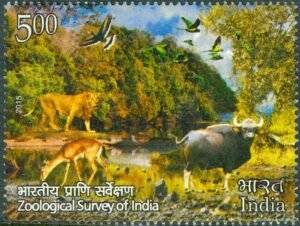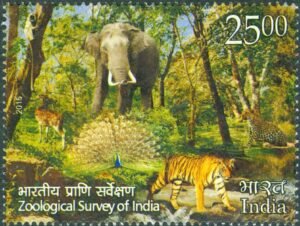Zoological Survey of India

Technical Data
| Date of Issue | December 3, 2015 |
|---|---|
| Denomination | Rs. 30 |
| Quantity | 100,000 |
| Perforation | 14½ |
| Printer | Security Printing Press, Hyderabad |
| Printing Process | Wet Offset |
| Watermark | No Watermark |
| Colors | Multicolor |
| Credit (Designed By) | Mr. Suresh Kumar Smt. Alka Sharma |
| Catalog Codes |
Michel IN BL135 Stamp Number IN 2773a Yvert et Tellier IN BF120 Stanley Gibbons IN MS3118 |
| Themes | Animals (Fauna) | Anniversaries and Jubilees | Birds | Cattle | Elephants | Mammals | Tigers | Wild Cats |
Stamps in this Miniature Sheet
India’s Biological Wealth and the Role of the Zoological Survey of India
India is one of the world’s richest countries in terms of biological diversity, owing to its unique biogeographical position, highly varied climatic conditions, and immense biodiversity and geodiversity. According to global biogeographic classification, India encompasses two major realms—the Palaearctic and the Indo-Malayan—as well as three prominent biomes:
- Tropical Humid Forests
- Tropical Dry/Deciduous Forests
- Warm Deserts and Semi-Deserts
Although the country occupies just 2.4% of the world’s land surface, it hosts more than 7.5% of the world’s known animal species, amounting to nearly 92,000 identified faunal species. This highlights India’s remarkable position as a reservoir of global biodiversity.
A Century of Scientific Exploration
The Zoological Survey of India (ZSI) was founded on 1 July 1916 with the objective of promoting systematic survey, exploration, and research on the rich animal diversity of the Indian subcontinent. Its origins go back to the Museum of the Asiatic Society of Bengal (1814–1875) and later the Zoological Section of the Indian Museum (1875–1916) in Kolkata.
Over time, ZSI has consistently strengthened its scientific staff and expanded the scope of its programmes, enabling it to meet the scientific challenges of the past and prepare for those of the future. Its mandate broadened significantly after India ratified the Convention on Biological Diversity (CBD) in 1994, emphasizing biodiversity conservation, sustainable utilization of biological resources, and effective dissemination of faunal knowledge.
Growth and National Presence
As the life sciences gained momentum in India, ZSI’s expansion was integrated into the country’s Five-Year Plans. Today, the Survey operates through 16 Regional and Field Stations across India and has grown into a premier national institution with its headquarters in Kolkata.
ZSI is the custodian of the prestigious National Zoological Collections, comprising more than one million identified specimens from every major animal group, ranging from Protozoa to Mammals.
Scientific Research and Publications
ZSI conducts extensive field explorations throughout the country to advance studies in:
- Faunal diversity and taxonomy
- Systematic zoology
- Animal ecology
- Wildlife biology and zoogeography
- Marine and freshwater fauna
- Animal behaviour and population studies
The results of its explorations and research are published regularly in ZSI’s own journals and in notable national and international scientific publications.
In recent years, ZSI has adopted an integrated approach to zoological research, blending biological, cytotaxonomic, and ecological studies to achieve more purposeful and impact-driven outcomes.
Scientific Services and Capacity Building
ZSI plays a vital role in monitoring the population status of species of economic and ecological importance. It provides:
- Data on commercially important fauna
- Guidance on underutilized and culturable species in terrestrial and aquatic environments
- Early warnings on population decline to ensure sustainable use of biological resources
Additionally, ZSI regularly provides identification and advisory services to more than 200 universities and numerous research institutions across India. It offers:
- Short-term taxidermy training
- Annual training programmes on collection, preservation, and identification of economically important insects and mites
These initiatives reflect ZSI’s commitment to nurturing scientific skills and supporting biodiversity research nationwide.
A Century of Dedicated Service
As the Zoological Survey of India approaches a century of exemplary service, it stands as a crucial national knowledge repository and a scientific pillar supporting India’s biodiversity conservation efforts. The institution continues to guide the Ministry of Environment & Forests, Government of India, in formulating and implementing policies for the protection and sustainable use of the country’s rich faunal heritage.



Leave a Comment
You must be logged in to post a comment.